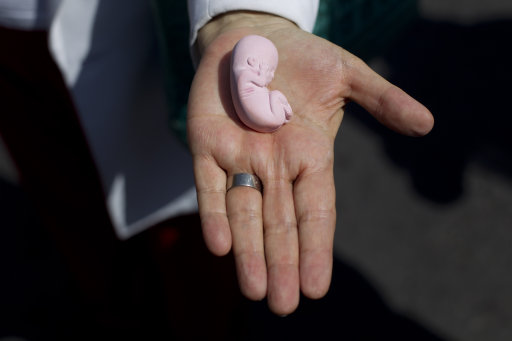
The abortion expansion ballot measure proposes amending the Nebraska Constitution to prevent the state from protecting unborn babies from abortion until the point of fetal viability, or when the life and health of the mother is at stake. However, to legally appear on voters' ballots in November, the measure must address only a single subject.
Thomas More Society attorneys argued in the brief that the ballot initiative contains "remarkably misleading terms" and is "unconstitutionally riddled with separate subjects," in violation of the Nebraska Constitution's Single Subject Rule.
The petition also seeks to roll back numerous popularly supported laws regulating abortion. The language of the proposed amendment would effectively repeal more than 50 years of laws the state has passed and have wide-reaching effects on many other fields of medicine, the conservative non-profit argued.
The existing laws include the state's dismemberment abortion ban and the parental notification requirement for abortions on minors. Laws requiring physician involvement, physician availability for postoperative care, care of born-alive aborted infants, care of post-viability aborted infants and detailed informed consent requirements, will effectively be repealed if the abortion expansion ballot initiative is accepted by voters.
The brief further argues that the abortion initiative opens the determination of viability to a large number of non-physician "health care practitioners." Under current Nebraska law, "health care practitioners" include not only physicians, but also psychiatrists, pharmacists, nurses of varying degrees, and many others.
The pro-life advocates asked the state Supreme Court to hear their challenge to the law and they were granted only 15 minutes to state their case for why the ballot measure either satisfies or violates the criteria laid out in Nebraska state law.
Meanwhile, Protect Our Rights, the lobbying group behind the ballot measure said that the ballot measure is needed to give Nebraska residents the power to control their bodies, health and future.
On the other hand, Priests for Life stands with the Thomas More Society in this fight.
"We stand in strong support of the Thomas More Society, with whom we have worked closely for decades," said Priests for Life National Director Frank Pavone. "If Nebraska's lawmakers and citizens were able to have an honest debate about abortion, this amendment would fail at the ballot box. But abortion advocates are never honest about what it is they are promoting – that is, the brutal death of an unborn child."
The organization added that abortion advocates have been able to lie about abortion for far too long. "We can't let them continue to get away with it," it continued.
States that outlawed abortion
Abortion is one of the major talking points in the ongoing presidential election campaigns. Decisions as to who is going to be cast in the ballots are largely relative to where the state stands on this issue.
Vice President Kamala Harris has promised to "restore" abortion rights federally while former President Donald Trump has said recently he will leave the issue to states. Some states are also voting in referendums specifically on abortion. (Related: Trump says he'll VOTE NO on Florida's pro-abortion amendment.)
The Supreme Court overturned Roe v. Wade and rescinded the constitutional right to abortion in June 2022. That decision returned control over the procedure back to individual states. Some states have enacted total bans, while others protect the procedure throughout pregnancy.
As of August, 17 states have outlawed nearly all abortions, banning the procedure at six weeks of pregnancy or earlier. Some have narrow exceptions for cases of rape, incest or the health of the mother. These states, including Texas, Florida and Alabama, are under Republican control with many clustered in the American South.
Another eight states allow some access to the procedure. These states bar abortion sometime between 12 and 23 weeks of pregnancy. The other 25 states, plus the District of Columbia, protect abortion up until the point of fetal viability. Nine of these states, as well as D.C., go even further and do not restrict abortion based on gestational duration.
Abortion bans cover both surgical and medication abortion, meaning healthcare providers in these states are prohibited from prescribing abortion pills. But in some cases, abortion medication has been used to circumvent these bans. Some medical professionals in abortion-friendly states have begun prescribing the pills and sending them by mail to patients in restrictive states.
Abortion itself will be also on the ballot in several states. Eleven states, including Florida, Arizona, Maryland and Nebraska, have confirmed referendums on abortion access for November.
Abortions.news contains similar stories.
Watch the video below that talks about Arizona residents voting for abortion rights in November.
This video is from the Trending News channel on Brighteon.com.
More related stories:
FETUS LIVES MATTER: Kommie Harris and Walz are both radical abortion extremists who support genocide by killing 3rd term fetuses and babies on their day of birth (op-ed).
Tim Walz left EIGHT babies who survived botched abortions to DIE, government data shows.
Arkansas Supreme Court confirms radical pro-abortion amendment WON'T APPEAR on November ballot.
Dems, pro-abortion organizations turn to ballot initiatives to enshrine abortion rights into state constitutions.
Sources include:
LifeSiteNews.com
CDN.Prod.Website-Files.com
ThomasMoreSociety.org
NorfolkNERadio.com
BBC.com
Brighteon.com
Source link

